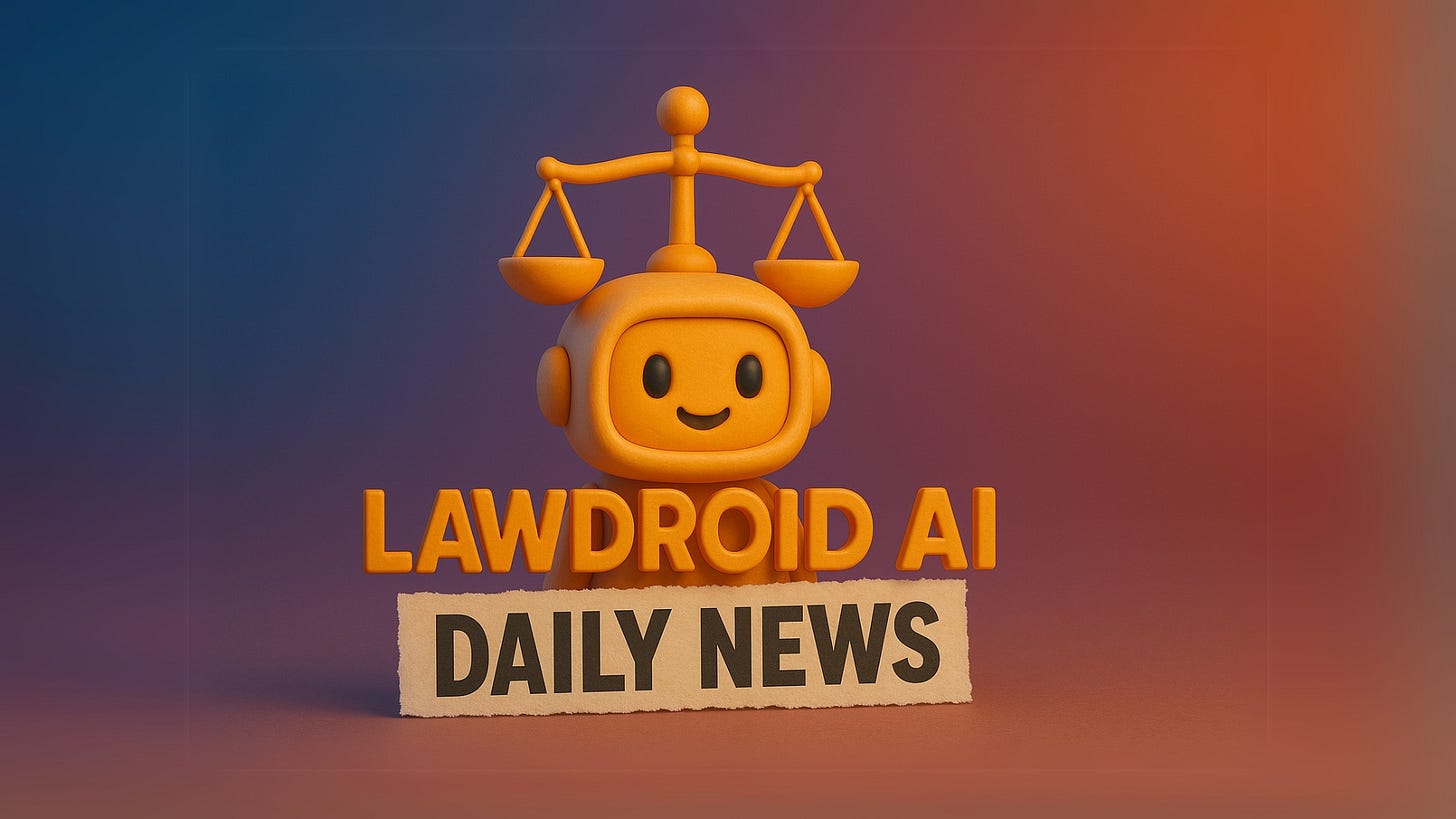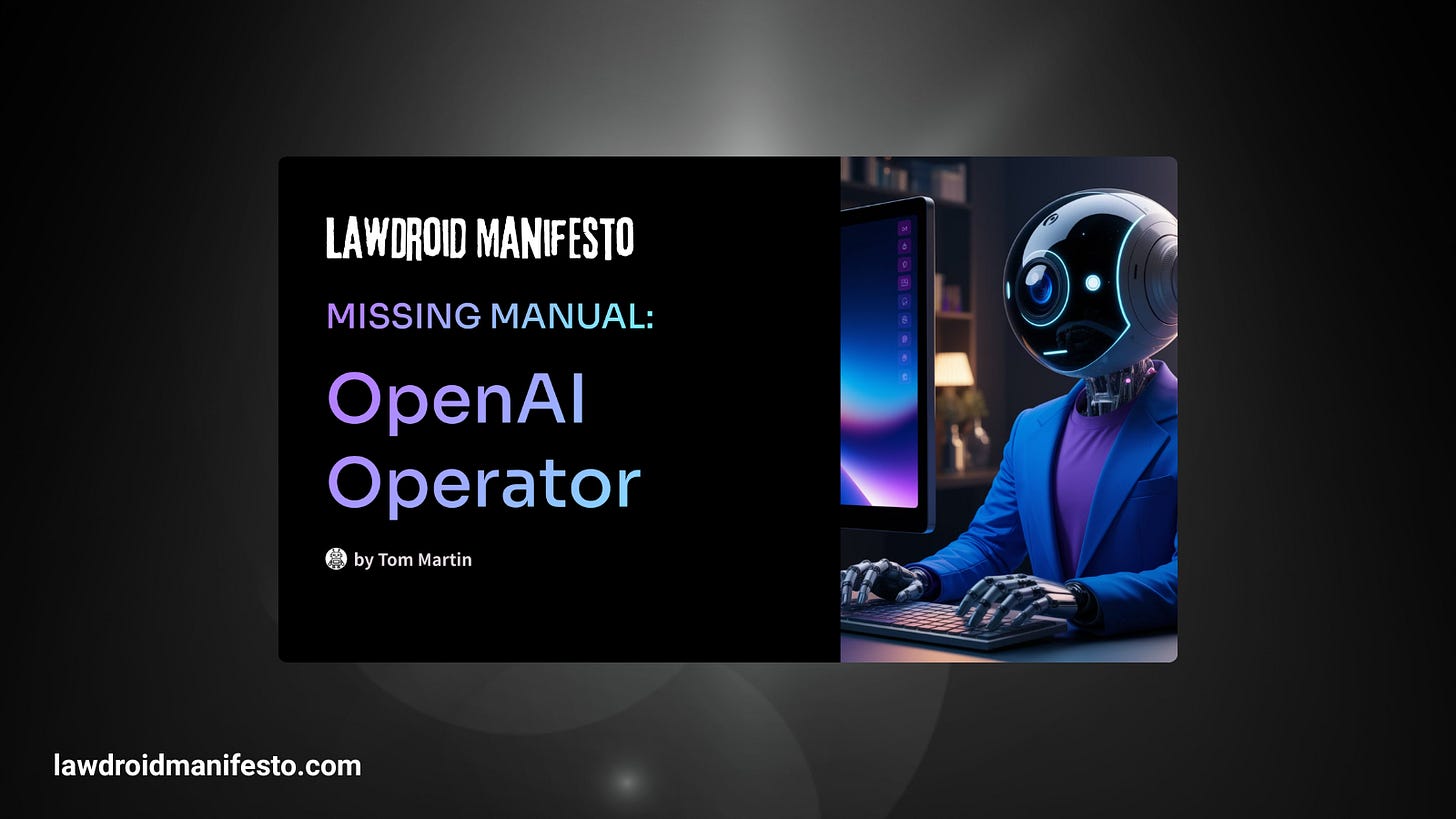Daily News: April 14, 2025
AI news that pops: daily insights, fast takes, and the future right in your inbox
Hey there friends👋! In today’s edition, you’re getting 5 🆕 news items and my take on what it all means. That’s it — delivered to your inbox, daily.
Subscribe to LawDroid Manifesto and don’t miss tomorrow’s edition:
LawDroid AI Daily News, is here to keep you up to date on the latest news items and analysis about where AI is going, from a local and global perspective. Please share this edition with your friends and colleagues and remember to tell me what you think in the comments below.
Today’s News
Here are the top 5 recent news items on artificial intelligence:
1. Getty Images Chairman Criticizes UK AI Copyright Reforms
Mark Getty, chairman of Getty Images, has criticized UK government plans to reform copyright laws to facilitate AI development, calling them “shortsighted” and a concession to foreign corporate interests. The proposed regulations would allow AI companies to use copyrighted materials without prior consent unless rights holders opt out. This has sparked opposition from the creative sector and luxury goods industries, which argue the changes undermine intellectual property rights and fair compensation. Getty supports parliamentary efforts led by Baroness Kidron to amend the Data (Use and Access) Bill to strengthen copyright protections, though Labour removed those amendments in the Commons.
Source: https://www.thetimes.com/uk/technology-uk/article/labour-ai-copyright-laws-getty-chairman-dgvxf8fgt
2. MIT Economist Advocates for AI as a Tool to Enhance Human Capabilities
Economist Sendhil Mullainathan of MIT argues that the impact of AI on jobs depends on how the technology is developed and applied. Rather than viewing AI solely as a force of automation that replaces human tasks, Mullainathan advocates for an augmentation-focused approach, where AI is used as a tool to enhance human capabilities, what Steve Jobs once referred to as a “bicycle for the mind.” He criticizes current AI development for prioritizing automation benchmarks, which overlook the potential to design AI that supports human decision-making and learning.
Source: https://www.wsj.com/tech/ai/ai-jobs-mit-sendhil-mullainathan-135ad2b7
3. Scale AI CEO Warns U.S. Risks Falling Behind China in AI Development
Alexandr Wang, CEO of Scale AI and the world’s youngest self-made billionaire, warns that the U.S. risks falling behind China in artificial intelligence (AI) development. Highlighting China’s integrated, government-led AI strategy aimed at global leadership by 2030, Wang expresses concern about potential national security threats if China gains a technological upper hand. Wang, whose company supports both commercial and defense AI applications, advocates for a comprehensive U.S. strategy on data and AI infrastructure.
Source: https://nypost.com/2025/04/11/business/scale-ai-ceo-alexandr-wang-issues-stark-warning-about-china
4. NHS Hospital Pioneers AI for Instant Skin Cancer Diagnosis
An NHS hospital in Chelsea and Westminster is utilizing artificial intelligence (AI) for swift and autonomous skin cancer diagnosis, marking a worldwide first and heralding a new era in cancer care. Staff use an iPhone with a magnifying lens to take photos of suspicious moles, which are analyzed in seconds by the AI app. Almost half of patients receive an immediate all-clear, with the remaining scheduled for specialist consultations and treatment. This groundbreaking AI tool, called Derm, boasts 99.9% accuracy in ruling out melanoma and significantly reduces waiting lists by allowing doctors to focus on severe cases.
5. AI’s Impact on Jobs: Lessons from the Luddite Movement
A recent article draws parallels between the Luddite movement of the early 19th century and current anxieties over artificial intelligence. The Luddites, skilled English textile workers, protested against mechanization that threatened their livelihoods. Similarly, modern workers fear AI could displace millions of jobs. While some economists see potential for AI to augment human labor and boost productivity, others warn it may reinforce inequality and centralize power among tech elites. The article suggests that failing to regulate AI development could lead to greater social and economic instability.
Source: https://www.newyorker.com/magazine/2025/04/21/how-to-survive-the-ai-revolution
Today’s Takeaway
I find today’s headlines deeply revealing, highlighting that we’re facing a crucial moment where the benefits of AI are real and transformative, yet come intertwined with complex ethical and social risks. Getty’s pushback against copyright reforms shows the worrying tension between creativity and corporate exploitation, raising serious concerns about who controls (and profits from) AI’s growth. MIT’s Mullainathan offers a hopeful perspective, emphasizing that if we consciously design AI as a partner rather than a replacement, we can genuinely enhance human capabilities. Alexandr Wang’s warning about U.S.-China competition underscores the urgent need for strategic clarity; AI’s geopolitical implications are rapidly becoming unavoidable and require careful handling to avoid dangerous escalation. The NHS’s skin cancer breakthrough powerfully illustrates AI’s profound potential to save lives, yet it also reminds us that careful oversight and ethical boundaries are essential. Finally, recalling the Luddite experience is critical: it’s a clear reminder that without proactive regulation and thoughtful policy, AI could deepen social inequalities and fuel widespread economic instability. We urgently need wise, decisive leadership to shape AI’s trajectory responsibly, before it reshapes us.
Subscribe to LawDroid Manifesto
LawDroid Manifesto, your authentic source for analysis and news for your legal AI journey. Insightful articles and personal interviews of innovators at the intersection of AI and the law. Best of all, it’s free!
By the way, as a LawDroid Manifesto premium subscriber, you would get access to exclusive toolkits, like the Missing Manual: OpenAI Operator, coming out this month…
With these premium toolkits, you not only learn about the latest AI innovations and news items, but you get the playbook for how to use them to your advantage.
If you want to be at the front of the line to get first access to helpful guides like this, and have the inside track to use AI as a force multiplier in your work, upgrade to become a premium LawDroid Manifesto subscriber today!
I look forward to seeing you on the inside. ;)
Cheers,
Tom Martin
CEO and Founder, LawDroid




